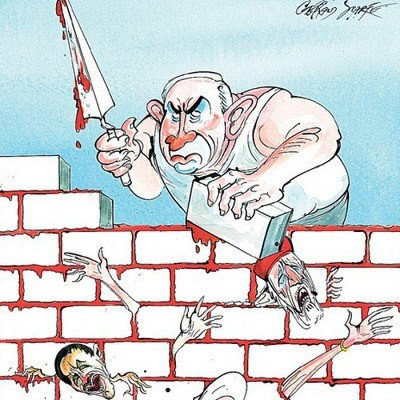Rupert Murdoch Condemns Sunday Times Netanyahu Cartoon: What Is Blood Libel?

Media tycoon Rupert Murdoch has chimed in on the furor surrounding the publication of a controversial cartoon in News International's Sunday Times, which depicted Israeli Prime Minister Benjamin Netanyahu appearing to lay bricks for a wall using the blood of Palestinians. The cartoon's caption reads, "Will cementing the peace continue?"
The Times had previously defended Gerald Scarfe's cartoon, with a statement saying the newspaper "firmly believes that it is not anti-Semitic. It is aimed squarely at Mr. Netanyahu and his policies, not at Israel, let alone at Jewish people."
The outspoken Murdoch took to Twitter on Monday to express his disapproval and offer a rare apology on behalf of one of his publications. "Gerald Scarfe has never reflected the opinions of the Sunday Times," he tweeted. "Nevertheless, we owe major apology for grotesque, offensive cartoon."
The cartoon, which likely would have faced backlash regardless of its publication date, was particularly ill-timed as it ran on International Holocaust Remembrance Day. Scarfe himself apologized "for the very unfortunate timing" of the cartoon in an interview with the Jewish Chronicle and said in a statement on his website that he had not been aware the cartoon would run on Holocaust Remembrance Day.
According to the Telegraph, the Board of Deputies of British Jews expressed its objection to the Press Complaints Commission shortly after the cartoon was published, charging the Times with publishing an item that was reminiscent of illustrations seen in "the virulently anti-Semitic Arab press." Specifically, critics of the cartoon are accusing it of "blood libel," a centuries-old false accusation that Jews used the blood of slaughtered Christians in rituals, including the preparation of matzah. According to the Anti-Defamation League, which has called for an apology from the Times, the charge dates back to the 12th century, when a young boy was found dead in Norwich, England, and a monk accused Jews of torturing and killing the child in a mock crucifixion.
"This is the stuff which historically justified hatred of Jews and led to the wholesale slaughter of Jews," ADF International Affairs Director Michael A. Salberg told the Algemeiner.
The definition of blood libel in the Encyclopaedia Judaica, as referenced in a 2011 BBC article, explains further that blood libel can represent a "form of the belief that Jews had been and still were responsible for the passion and crucifixion of Jesus Christ" and "popular beliefs about the murder-lust of the Jews and their bloodthirstiness, based on the conception that Jews hate Christianity and mankind in general." Inferences to Jewish ritualistic murder were also used in Nazi propaganda in the 1930s.
In 2011, Sarah Palin was widely criticized for using the term in response to critics who accused her rhetoric of inspiring the Arizona shooting that critically injured Congresswoman Gabrielle Giffords. In retaliation against accusers who linked the shooting with a map her campaign had published, which included crosshairs over Democratic congressional districts -- including Giffords' -- where she hoped to unseat the incumbent, Palin recorded a video message attacking "journalists and pundits" who "manufacture a blood libel that serves only to incite the very hatred and violence they purport to condemn." After her comments prompted an outcry, Palin later insisted that "blood libel obviously means being falsely accused of having blood on your hands."
By Tuesday, the Sunday Times has shown indications of a more conciliatory response to the anti-Semitism charges. According to a News International "insider" speaking to the Guardian, Acting Editor Martin Ivens is expected to meet with the Board of Deputies of British Jews on Tuesday afternoon and offer a personal apology for publishing Scarfe's cartoon.
© Copyright IBTimes 2024. All rights reserved.






















